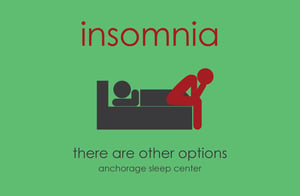Why Darkness Hurts Sleep
Alaskan winters consist of darkness for the majority of the day, while Alaskan summers consist of light for the majority of the day. The extreme lighting conditions of Alaska, especially north, affect Alaskan lives in many different domains:
- Psychologically
- Physiologically
- Habitually
- Emotionally
- Sociologically
While we generally associate darkness with sleep, endless darkness is bad for sleep. This is because melatonin, the hormone that regulates sleep, is light sensitive, and either increases production in response to increasing darkness or decreases production in response to increasing light.
Without a change in light, extreme darkness can cause poor melatonin regulation and result in the initiation or worsening of sleeping disorders in many people. Winter sleeping disorders that are most common in Alaska include:
- Insomnia
- Circadian Rhythm disorders
- Restless leg syndrome (RLS)
Due to these changes, Alaskans have to work harder to maintain a normal sleep schedule in winter and to also be wary of symptoms of sleeping disorders such as those listed above. Let’s look at them in more detail.
What Is Insomnia?
Insomnia is the persistent feeling that you cannot fall asleep, sleep through the night, or stay asleep until the morning.
Insomnia can be chronic, as in it's a problem that happens more nights of the year; primary, where it does not have an identifiable cause; or secondary where there is an identifiable cause.
 Additional insomnia symptoms include:
Additional insomnia symptoms include:
- Daytime sleepiness
- Fatigue
- Lack of motivation
- Problems with attention, memory, or concentration
- Concerns and frustrations related to sleep (or lack of it)
- Moodiness
- Inability to fall asleep at desired times (i.e., erratic sleep cycle)
Source: [SleepEducation]
The major concern with insomnia is severe sleep deprivation.
What is Restless Leg Syndrome?
Restless leg syndrome (RLS) is a nervous system disorder characterized by uncomfortable feelings in your legs and other extremities during the night. RLS usually causes enough discomfort to interfere with sleep, causing sleep deprivation.
The uncomfortable feelings can be described as:
- Aching, throbbing, or burning
- Cramping (especially in calves)
- Jerking
- Buzzing or vibrating feelings
- Itchy feeling
- Feeling of pins and needles
- Creepy crawly feeling
- Irresistible urge to move your leg to relieve the discomfort
The primary problem associated with restless leg syndrome is sleep deprivation because RLS is improved when one wakes up and moves their leg to ease the discomfort.
What Are Circadian Rhythm Disorders?
The circadian rhythm is basically a “biological sleep clock.” It is a part of your brain called the suprachiasmatic nucleus of the hypothalamus and sits right behind the nerves of your eyes.
Circadian rhythm disorders include insomnia but also encompass any type of sleeping problem you may have, such as:
- Erratic sleep pattern
- Ever-shifting biological clock
- Natural sleep/wake times that are abnormal
A good example of this is Jet Lag, which is a temporary circadian rhythm disorder that makes it difficult to sleep at “regular” times, but once asleep you don’t have trouble getting enough sleep.
Ways to Overcome Alaskan Sleep Problems
As we have mentioned in other articles, here is a list of good things to do to prevent or mitigate sleeping problems:
- Light therapy – the number one most effective technique for most people in Alaska
- No alcohol right before bed
- Limit total caffeine intake
- Limit caffeine intake after noon
- Limit liquids directly before bed
- Take a hot bath right before bed
- Do the same actions before bed every evening
- Cut out blue light (TV, computers, smartphones) in the hour leading up to bed
- Using scents, such as essential oils
- Listen to the same music before bed
- Do a specific calming activity, such as meditation, or washing, right before bed
- Find an activity outside you like
- Get a gym membership
- Get an at-home workout series
Some sleep disorders require more than self-management to overcome. If you have tried everything, take this free online sleep test to get in contact with our sleep health professionals and begin exploring your options.

.png?width=750&name=Sleep%20disorders%20that%20get%20worse%20in%20Alaskan%20winters%20(2).png)
